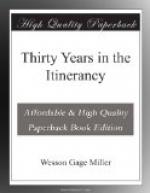The District at this time included nineteen charges. The larger portion of them could be reached by railroad, but a sufficient number lay off the line of public conveyance to render it advisable to keep a horse and buggy, and hence they were obtained.
Soon after reaching my new field of labor, my attention was called to the financial condition of the District Parsonage. I found that a small debt had come down from the erection of the building, which had been increased from year to year by accruing interest and repairs, until at this time the entire indebtedness amounted to nine hundred and thirty-one dollars. Meantime there had been, during the preceding year of financial pressure, such a depreciation of property in the village, that the building was now worth but little more, if any, than the amount of indebtedness.
In looking the matter over, I saw at a glance that it would be much easier to build a new house in a desirable location than to pay an old debt of this magnitude. But there were other interests to be considered. The money for the erection of this Parsonage had been given in good faith by the people, and if it were now permitted to pass out of the hands of the Trustees, there would be a shock to the confidence they had reposed in the administration of the Church. And in the next place, this money had been borrowed of innocent parties, and it was but right that it should be returned.
With these views, I undertook to save the property, but I am free to say it was the most thankless financial task I had ever undertaken. I gave the first one hundred and fifty dollars, and then divided the balance among the charges of the District. In passing around to my Quarterly Meetings, the amounts in most cases were pledged, and the larger portion finally paid. Yet the collections were not fully completed before the end of my term.
Milwaukee at this time still retained its three charges, and they were now in charge respectively of Rev. J. M. Walker, Rev. E. Cooke, D.D., and Rev. A.C. Manwell. As stated in a former chapter, Brother Walker had served his full term on the Beaver Dam District, where he had been very popular. He entered upon his field with great spirit, but found himself greatly embarrassed by the unhappy financial condition of the charge. Besides the indebtedness remaining on the Church, there remained considerable arrears on the salaries of preceding Pastorates.
This paying a Pastor at the end of his term in notes, that shall come back to haunt his successor, is not in keeping with the financial genius of the Church. I once had some sad experience in that line, and since it was not in Milwaukee, I will take occasion to refer to it in this connection. It was at a time when the slip rents were not large, averaging only about two hundred dollars a quarter. In the case referred to, the two hundred dollars of the first quarter of my year, had been absorbed to meet the claims of the outgoing Pastor. And then, as he was still behind two hundred dollars, a note was given him for the balance. By this arrangement, the first half year of my term had been anticipated, and had not the people, finding out the state of the case, come to my aid with a good donation, I must have been greatly embarrassed.




